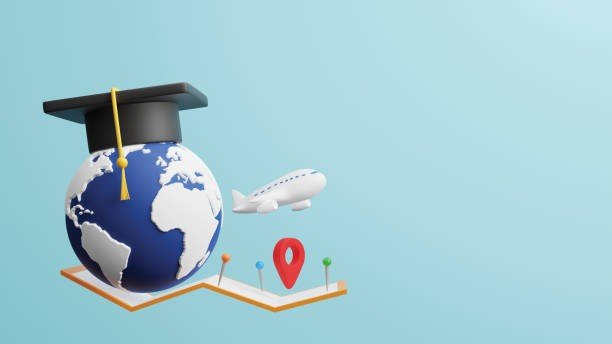Setting out on a global educational adventure is a life-changing event that doesn’t stop in the classroom. The topic of “Study abroad return on investment (ROI)” has gained traction as students look more and more for global perspectives. This statistic explores the advantages that people who invest in an international education receive, both material and immaterial. The return on investment (ROI) includes cultural enrichment, language learning, and a broader perspective in addition to the obvious financial benefits.
Examining the professional, emotional, and academic benefits, this research goes beyond simple financial estimates. Studying abroad is an investment in one’s education, personal development, and cross-cultural competency. Come along with me as I explore the many facets of “Study abroad return on investment,” where the real benefit of international education can be shown in how people develop holistically, overcoming national boundaries to become tomorrow’s leaders.

In the context of studying abroad, how is return on investment (ROI) calculated?
Beyond financial reasons, the “Study abroad return on investment” provides a comprehensive indicator. In the context of foreign education, the equation becomes more complex than it is in typical ROI calculations, which compare expenses against cash rewards. It includes both the short-term financial rewards from the experience as well as the long-term ones, like living expenses and tuition.
Evaluating academic success, job advancement, and personal development are all part of calculating the return on investment of studying overseas. Success stories from people who studied overseas frequently show how their professional and personal development was greatly aided by the knowledge and insights they acquired during their time away.
What variables, outside of money, affect the overall return on investment of studying abroad?
The “Study abroad return on investment” is dependent on a number of factors in addition to financial ones. Academic growth is an essential component since it can improve a student’s learning experience by exposing them to a variety of teaching approaches, cultural viewpoints, and educational systems. This experience develops flexibility and analytical abilities, which enhances a well-rounded education.
Moreover, the ROI as a whole greatly depends on personal growth. Resilience and independence are cultivated by the difficulties of adjusting to a new culture and environment away from home. Increased self-assurance, independence, and a more expansive perspective are possible outcomes of this life-changing experience, all of which are priceless in today’s interconnected global society.
Are there any particular fields or vocations where the ROI of studying abroad is especially high?
Yes, the “Study abroad return on investment” is highly valued in several industries. NGOs, international business, and diplomacy are examples of global industries that frequently give preference to applicants with foreign experience. Proficiency in navigating heterogeneous cultural environments and facilitating cross-border communication are valuable attributes in these domains.
Furthermore, the relevance of a global viewpoint is rising in the technology and innovation sectors. As the world’s businesses grow increasingly interconnected, experts with direct cultural knowledge provide distinct perspectives and innovative methods to problem-solving.
Read Also: Study Abroad Destinations
How can language learning and cultural enrichment fit into the ROI calculation for overseas education?
The development of language skills and cultural enrichment are essential elements of the “Study abroad return on investment.” Cultural intelligence is cultivated via exposure to several cultures and is a highly sought-after ability in today’s global workforce. People who have personally handled cultural differences are typically more flexible, understanding, and productive in a variety of professional settings.
Learning a language improves communication abilities and opens up more career options, regardless of whether it is done through traditional schooling or immersion experiences. Multilingualism is a benefit in many fields, which increases the overall return on investment of studying overseas.
Exist any financial aid or scholarship programs that can help lower costs and increase the return on investment of studying abroad?
To help people get the most out of their “Study abroad return on investment,” there are a lot of financial aid and scholarship opportunities available. Scholarships are provided by numerous governments, academic institutions, and commercial groups expressly for students from other countries. The weight of tuition, housing, and other related expenses can be considerably lessened with the help of these financial aid programs.
Furthermore, there are frequently work-study options and part-time jobs available for students, giving them a way to partially offset some of the expenses while gaining useful work experience. Investigating these choices guarantees that a wider spectrum of people can benefit from studying abroad.
Which real-world instances or success stories best illustrate the long-term advantages and return on investment of studying abroad?
There are numerous real-world success stories that demonstrate the significant “Return on Investment” and long-lasting effects of studying abroad. People who have studied overseas frequently discover that they are more adept at navigating the challenges of today’s interconnected globe.
Take Maria, for example, who completed her international relations program with a semester spent studying abroad in Japan. In addition to her academic growth, she gained a deep comprehension of Japanese language and culture. Her capacity to overcome cultural divides became a useful asset in her subsequent career as a cultural liaison with an international consulting firm, thanks to this unique experience.
John was similarly exposed to a variety of business techniques and viewpoints by virtue of his choice to study business in Europe. Equipped with this global perspective, he used the knowledge he acquired while traveling overseas to launch a prosperous international business consulting firm when he returned home.
Beyond financial calculations, the concept of “study abroad return on investment” is dynamic and diverse. An individual’s long-term success is greatly influenced by the progress in their academic, personal, and professional spheres that comes from an international education. Studying abroad has long-lasting and transformative benefits, whether they are quantified in terms of language ability, cultural intelligence, or job gains. As more people see the benefits of this investment, the world community is enhanced by a diversity of viewpoints and linked professionals influencing the future.
Study Abroad Return on Investment (ROI): Examining the Transformative Landscape
Studying abroad is more than just a school project; it’s an investment in one’s own personal and professional development that goes beyond conventional measurements. “Study abroad return on investment (ROI)” is a broad term that includes everything from long-term career rewards to cultural enrichment. We’ll explore the nuances of studying abroad in this post, as well as how it affects people’s lives and results in a comprehensive return on investment.
Read Also: International Student Success Stories
Lifting the Curtain: What Makes Study Abroad ROI?
Beyond monetary advantages, the “Study abroad return on investment” is a complex statistic. The ultimate return on investment is found in the holistic development that each individual experiences, even though the upfront costs of tuition, housing, and living expenses do play a role. The development of global perspectives, personal growth, and academic successes are major factors that add to the overall worth of studying abroad.
Academic Enhancement: Extending Beyond the Classroom
Studying overseas gives students the chance to interact with various teaching pedagogies, educational frameworks, and cultural viewpoints, opening access to a variety of academic experiences. For instance, an environmental science student in Australia may participate in fieldwork that investigates the distinctive ecosystems of the area, providing a practical and hands-on learning experience. This experience develops critical thinking and adaptability in addition to academic knowledge.
Self-improvement: Handling the Unknown
A study abroad experience can lead to incalculable personal improvement. Living in a foreign country and away from familiar surroundings forces people to push themselves beyond their comfort zones. Resilience, independence, and self-reliance are increased as a result of this life-changing event. Take Sarah, for example. She studied literature in Italy. Her scholastic experience was enhanced by the difficulties of adjusting to a new language and culture, which also helped to shape her into a more self-assured and accepting person.
Global Networking: Establishing Links Beyond National Boundaries
The worldwide network formed during this time is one frequently overlooked component of the “Study abroad return on investment”. A broad and varied network that may be utilized throughout a person’s career is created by the friendships and business relationships made with colleagues from around the globe. These relationships turn into priceless assets, providing access to global opportunities and insights into various industries.
Read Also: Private And Public Organizations Funding Studying Abroad
The Value of Cultural Intelligence in the Global Workplace
One of the main benefits of studying abroad is cultural enrichment, which raises the return on investment considerably. Being exposed to many cultures develops cultural intelligence, a talent that is highly valued in the worldwide workforce of today. People with firsthand experience of different cultures bring a special viewpoint to the workplace. An individual who pursued business studies in China, for example, would not only get knowledge of the business culture of the country but also acquire cultural fluency that is highly advantageous in cross-border discussions.
Language Ability: Filling up the Communication Gaps
One concrete result of studying abroad is picking up a language, which has a significant impact on the “study abroad return on investment.” Speaking many languages improves communication abilities and provides access to more career options. Spanish learners in Argentina not only acquired fluency in the language but also developed a profound comprehension of Latin American culture, making them an invaluable asset to international corporations operating in the area.
Industry Highlight: Study Abroad ROI: Where Does It Thrive?
“Study abroad return on investment” is especially beneficial because there are certain companies that pay more for applicants who have experience overseas. Those who have studied overseas contribute a sophisticated perspective of international relations and cultural diplomacy to the area of diplomacy. In a similar vein, people with cross-cultural navigation skills are highly valued in the computer business, given its global reach. People with a broad global perspective are also beneficial to startups and entrepreneurship, as creative ideas typically emerge from the junction of several cultural influences.

Financial Assistance and Scholarships: Increasing Access to Study Abroad
There are several scholarships and financial aid options available to help reduce the financial barrier to studying abroad. These chances guarantee that the advantages of studying abroad do not belong to an elite group of people. Financial assistance is provided by governments, academic institutions, and commercial organizations. It takes several forms, from fully funded scholarships to partial tuition exemptions. Students can also earn significant work experience through work-study programs, which can help to defray some of the costs related to studying abroad.
Actual Success Stories: Illustrating the Measurable Effect
True success stories from real-world situations are used to illustrate the “Study abroad return on investment”. Take Alex, for example. He studied architecture in Japan. His encounters with a distinctive fusion of modern technology and traditional Japanese design ideas enhanced his academic understanding and shaped his approach to architecture. As a direct result of his study abroad experience, he currently runs a prosperous architectural practice renowned for its creative and culturally sensitive designs.
Read also: Cost-Benefit Analysis of Studying Abroad
Benefits Over Time: Going Beyond the Horizon
The long-term success of those who have accepted this life-changing experience is proof of the enduring advantages of studying abroad. Studying abroad has lifelong effects, whether one becomes the CEO of a multinational company or a cultural ambassador promoting international understanding. “Study abroad return on investment” is a value that lasts a lifetime and influences perspectives, careers, and the capacity to function in a globalized environment.
The idea of the “study abroad return on investment” is dynamic and ever-changing, including a wide range of advantages and experiences. Above and beyond the money, the real worth is in helping people grow holistically so they may become global citizens prepared to face tomorrow’s difficulties. As more people become aware of the life-changing possibilities of studying overseas, a more wide range of viewpoints are added to the global community, creating a more cohesive and compassionate society.
SEE ALSO:
Trust you found our article on Study Abroad Return On Investment (ROI) helpful. Follow our website for more interesting articles.
